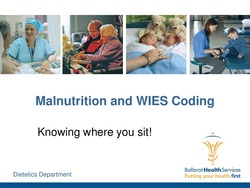Please use this identifier to cite or link to this item:
http://hdl.handle.net/11054/1166| Title: | Malnutrition weighted inlier equivalent separation (WIES) management. |
| Author: | Atkinson, Meredith |
| Issue Date: | 2018 |
| Conference Name: | Barwon South Western and Grampians Allied Health Conference 2018: Engage, Create, Connect: Allied health working together |
| Conference Date: | May 31 |
| Conference Place: | Warrnambool, Australia |
| Abstract: | INTRODUCTION: 40% of all patients admitted to acute hospitals are at a high risk of malnutrition. Malnutrition is associated with significant costs both to the patient and the health service, including delayed wound healing, higher infection rates, reduced immune function and increased readmission rates. Malnutrition diagnosis is clearly recognised in the Weighted Inlier Equivalent Separation (WIES) and the Subjective Global Assessment (nutrition assessment) is used to identify the diagnosis. In 2015 only 194 cases were coded due to inadequate staff levels OBJECTIVE: To identify the incidence of malnutrition in acute inpatients and evaluate the impact of this on the WIES value for malnutrition diagnosis. METHODS: Two audits for malnutrition status were conducted in BHS acute services. Training in documentation skills for dietitians was carried out. A defined increase in staffing was utilized to assess the impact on WIES income for malnutrition diagnosis. RESULTS: In 2016 there were 1000 admissions per month, with 39% of BHS admissions identified to be at nutritional risk. Most of dietetics referrals (80%) were for malnutrition. Staffing levels only enabled 45% of referrals to be seen. Allocation of an additional 1.0 EFT for 17 days showed an increase in the value of the episode WIES from 0.33 to 2.81, with an average increase of $1,712 per episode (1 WIES = $4500). Total income from increased staffing $70,167.94. CONCLUSION: Addressing malnutrition early can reduce deterioration and resulting complications. The WIES value for an admission was increased significantly through increasing staff resource and education and enabling correct documentation and coding. |
| URI: | http://hdl.handle.net/11054/1166 |
| Internal ID Number: | 01156 |
| Health Subject: | DIETETICS NUTRITION ASSESSMENT MALNUTRITION DOCUMENTATION CODING HEALTH RESOURCES EDUCATION AND TRAINING |
| Type: | Conference Presentation |
| Appears in Collections: | Research Output |
Files in This Item:
| File | Description | Size | Format | |
|---|---|---|---|---|
| Malnutrition and WIES Coding.pdf | 403.07 kB | Adobe PDF |  View/Open |
Items in DSpace are protected by copyright, with all rights reserved, unless otherwise indicated.
